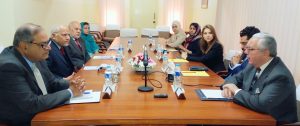Panel Discussion 01/01/2016
An Italian Ce.S.I. Delegation comprising of Professor Andrea Margelletti, Mr. Gabriele Lacovino and Ms. Francesca Manenti visited IPRI on November 20th, 2015 for an In-House discussion on subjects of mutual interest.
President IPRI welcomed Italian delegation and said that their last visit was very productive. The scholars were able to exchange views and IPRI was able to finalize a Memorandum of Understanding (MoU) with Ce.SI. The MoU would provide both the think tanks with lots of opportunities to interact with each other in the future. President IPRI also expressed deep condolences over the recent gory incidents in Paris. He said that the Paris attacks have been strongly condemned by the government and the people of Pakistan. He further said that terrorism needed a coordinated global response. The President also enquired about the impact of current situation in the Mediterranean countries on Europe.
The Italian delegation gave a presentation on the topic “Security in the Mediterranean, with reference to the Current Situation in Libya.” Professor Andrea Margelletti, Head of the delegation said that there was a difference between Daesh and Al-Qaeda because Italy had no information that there were any Europeans in Al-Qaeda but there were thousands of Europeans and Westerners from Australia, New Zealand, Sri-Lanka, USA, Philippines etc. inside Daesh. In Al-Qaeda, there were middle aged mostly men but in Daesh there were both young men and women. Italy did not consider Daesh more than a terrorist organization. Al-Qaeda had an ideological umbrella but the ISIS had its own capital, cities, municipalities, towns and firefighters. In history, no terrorist organization had its own capital. The ISIS had its own country, it had lots of money, complete economic system, millions of people under its cover, own system of welfare, own territory and strong communication channels. That was the reason why Daesh was so powerful. It had a very long term strategy. Its propaganda worked well as it was systematic and modern. People recognized this organization as very powerful in terms of security, military, economy and intelligence, as the main tools of the ISIS.
The Italian Delegation said that President Hollandne had said that the terrorist attacks were carried out by the soldiers of the army of the ISIS. Europe considers the ISIS more than a terrorist cell. The ISIS had deep tribal roots. Hundreds of thousands of ISIS members hailed from Europe. They were born in Europe. To tackle the ISIS was important for the European security because the ISIS members were not from any other region such as Africa but unfortunately they were Europeans. They had same passport, the Schengen Passport. But they didn’t consider themselves as Europeans.
President IPRI stated that causes of terrorism in developing countries were generally believed to be poverty, deprivation, etc. but Europeans were affluent and had no such issues. The President enquired as to whether the turmoil in the Middle East and some North African countries was the cause of restlessness in European youth. The Italian scholar replied that 90% Muslims were born in Europe and 10% were foreign immigrants. The fourth generation of European nation had socio-economic problems because of poor education and also because they felt alienated from Europeans. These people had lost interest in life, education and society. There was loss of identity and loss of nationalism. Therefore, Europe was facing the problem of integrating the young Muslim community, who was full of rage and anger, into the mainstream European society.
The Italian delegation said that the radicalization phenomenon rose in Europe because the ISIS lived in the world of internet/web. Their family was a web family. Through smart technologies they opened up to the web world. Ninety percent radicalization was spreading through web. The ISIS had very strong communication channels. Their organization had logistical and operational connection between France and Belgium. Nowadays, radicalization was done through web as it had been done through madrassehs in the past. Ninety percent of the world got radicalized through web, which was a strong system. The ISIS had used modern technology to influence new generations worldwide.
Professor Margelletti told IPRI scholars that cultural assimilation and amalgamation had been a problem in Europe for quite sometime. The phenomenon of immigration was centuries old in Europe but that was not true immigration. The people from Algeria, a former colony of France, moved from one region to another. It was just a change in their location and not cultural amalgamation. The immigrants had tried to duplicate the system in vogue in their countries in the host country. The problem of integration and radicalization has creeped into the genes of entire Europe and the European system had, therefore, fractured.
The Italian delegation further said that the situation in the Middle East had no relevance to the attacks in Europe. The ISIS was all across the world, in Tunisia, Libya, Syria, etc. it was a system that worked. Unfortunately, no one in Europe would like to afford the political and also the economic cost for building a coalition on ground in Syria. One could not win by air. The aerial bombing of the terrorist hideouts was not a logical solution but a strong trained police/ soldiers on ground were required to control crimes and attacks in the streets. Although Europeans had strong military side but they were divided into 28 countries with different foreign policies and they lacked a comprehensive common strategy to counter the threat of terrorism. Taking advantage of the European weaknesses, the ISIS had adopted the strategy of waging war and launching terrorist attacks in Europe.
Discussing Libya, Mr. Gabriele Lacovino said that the situation there was worse as there were Islamists and secular communists and also two different types of governments in Libya. There were growing threats of Daesh in Libya and other Jihadist groups in the region. There was struggle between older and new leadership of these groups. The new leadership was closer to Daesh just to gain power. The two governments were not interested in the political solution of the problem.
The Italian delegation said that the arms and ammunition used by the ISIS belonged to the defeated Iraqi army which the Europeans had supplied to them. The ISIS had capabilities, weapons and ammunition for years. Daesh was even exporting and selling oil. In the period of crisis, it was easy for the Syrian government to buy oil from Daesh because it was cheaper and had less transportation charges. There were several billion dollars given to Daesh by the Syrian government in the form of gold and billions as cash.
In the end, an IPRI scholar gave a presentation on “Current Efforts of Pakistan Government in dealing with Terrorist Threat and Pakistan’s Policies to enhance its Regional Relations.” The scholar said that Pakistan had been successfully pursuing its counter-terrorism policies. Pakistan had launched military operations such as Operation Rah-e- Rast in Swat Valley, Operation Rah-e-Nijat in South Waziristan Agency and now recently operation Zarb-e-Azb in North Waziristan Agency to eliminate militants threat from its tribal areas. Since 9/11 more than 5,000 army personnel had lost their lives and 15,000 had been injured in these operations. After operations, Pakistan army had launched de-radicalization projects as part of their counter terrorism strategy. The rehabilitation strategy focused on influencing ideological beliefs and behavioral modification as a way to mitigate future threats.
After the Peshawar APS attack in December 2014, there had been nationwide support for counter-terrorism policies of the Government. The government introduced the National Action Plan to deal with the issue of terrorism. The Karachi operation was launched to ensure total elimination of terrorists from the urban centres. The reconciliation process in Balochistan and reforms in FATA were a way forward in counter terrorism efforts by the Pakistan government.
Regarding Pakistan’s relations with neighbouring states, Pakistan had meaningful and peaceful relations with its neighbours. Pakistan had expressed its desire to have peaceful settlement of disputes with India on all matters through unconditional dialogue process. At regional level, P5 + 1 nuclear deal would have positive impact on Pakistan’s relations with Iran. The CPEC is a project of connectivity not only from North to South within Pakistan but would enhance East/West connectivity towards Afghanistan and India.
The Italian delegation concluded that radicalization and integration were the major problems in Europe. The world community needed to address the menace of terrorism which was a global threat. A comprehensive, political and long term strategy must be devised. The negotiation process must be initiated with the moderate factions to deal with terrorism. The world nations must unite together to address the deep rooted causes of terrorism. Immediate and effective de-radicalization measures should be implemented. Terrorism had a modern version now and internet was the basic tool for radicalization. Therefore, terrorism was not Islamic, it was terrorism of individual’s mind that knew no religion.
Conclusion
Radicalization and integration were one of the major problems confronted by Europe. The world community should jointly address the menace of terrorism. A comprehensive, political and long term strategy was needed to be devised.



